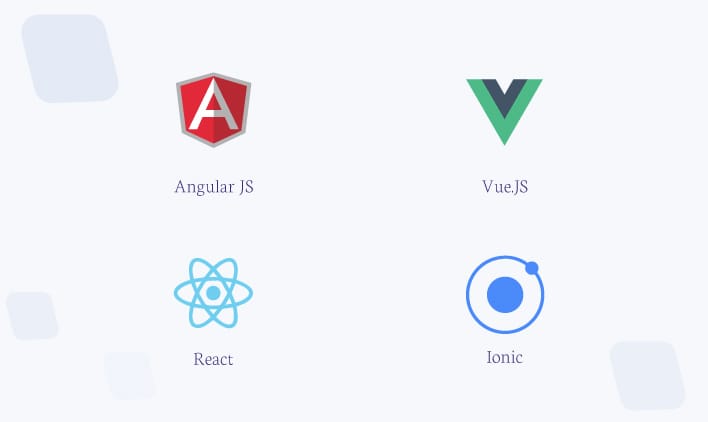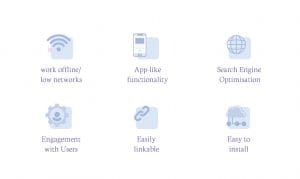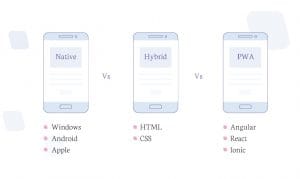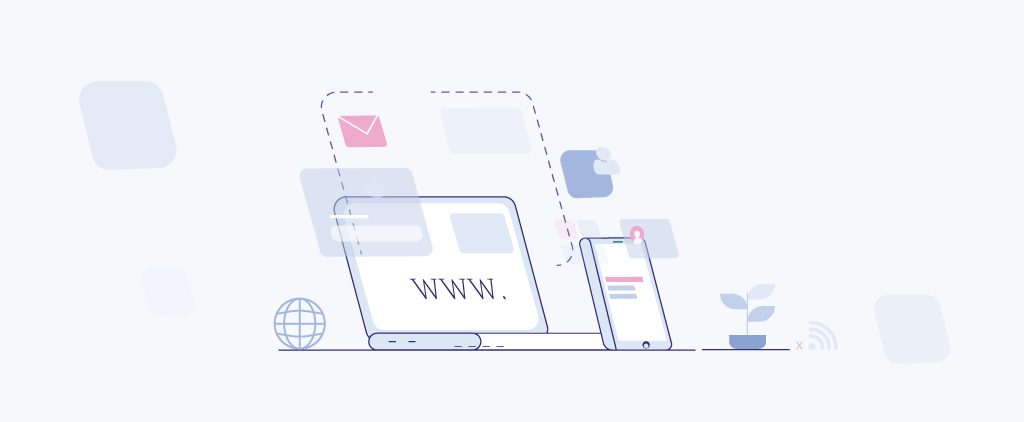Progressive Web Apps and the changing face of the mobile web
February 4, 2020
The Internet has come full circle. The evolution of the digital age began with the simple display of information through a single primitive web-page, which progressed into more sophisticated websites and applications for a wide variety of devices. This further transitioned in the last decade in the form of a huge surge in native apps developed for not just the mobile and hand-held tablets but also a slew of tactile movement driven wearables. Progressive Web Apps mark the return of web-based applications in circulation and for good reason too- get the best of both worlds, ie Web and Native app development.
What are Progressive Web Apps?
As the name suggests, progressive web applications are essentially regular web pages or websites but better. PWAs offer the user functionalities traditionally available only to native mobile applications such as push notifications, app-like interface, option to work offline and access to device hardware. This helps in bringing in greater visibility for the digital product or service at a fraction of the cost and effort.
In essence, PWAs are neither new nor revolutionary; in fact, they have been around forever. Progressive web app development refers to a set of techniques and best practices that make website pages look and feel like native apps. Unlike the latter, PWAs do not need to be downloaded from an app store, they can be accessed from the browser tab itself. The initial ‘download’ of a PWA is minimal in contrast with native apps where you download the full app upfront (many megabytes of assets).
Popular Progressive Web App Frameworks
If you’re thinking of developing a progressive web app, it’s important to pick the right framework to do so. There are many popular options available and you need to pick one that best suits your objective.

1. AngularJS
Angular is a framework developed by Google way back in 2009, although the current version features many more iterations and developments since then. This framework uses JScript to create easy to implement, robust apps backed by the best in class Google support.
2. React
This is a framework powered and maintained by Facebook which can be credited for the system’s smoothly functioning code. React makes use of JSX which enables greater flexibility and scalability to the framework.
3. VueJS
VueJS is one of the newer progressive web app frameworks in use. Compared to other frameworks in use, VueJS boasts of fast rendering coupled with non-complex coding which makes it easier for developers to adopt.
4. Ionic
Ionic is an open-source framework that was first developed in 2013. Rooted firmly in Angular, Ionic has been used for the creation of millions of native and hybrid apps. This framework employs Webview within the browser to deliver a native app experience in a web app.
5. Polymer
This is an independent open-source framework developed by Google equipped with a plethora of tools and templates that can be used to deliver great user experiences. The benefits of using this framework include a robust framework, easy to understand API powered with reliable support.
Features of Progressive App Development

Progressive Web Apps have a whole lot of features that make them really attractive for first time app development. They are a set of best practices that have been perfected over time to make a web app function like a desktop or mobile app. The real test of exemplary user experience is for the app development process to evolve to an extent such that the user can’t differentiate between a Progressive Web App and a native mobile app.
PWA combines the open standards of the web offered by cutting-edge browsers for rich mobile experiences that can load at record speeds even when the network is weak. This characteristic of PWAs makes them a far more efficient application to use, irrespective of individual device preference.
Let’s glance through some features of PWAs:
Connectivity through Service Workers – Progressive web apps are enhanced with service workers, ie, powerful proxies that enable users to work offline while the script runs in the background even on low-quality networks.
App-like functionality – Progressive web apps have a two-pronged functionality. It enables the initial load of a mobile web app is stored in a basic shell with an icon on the home screen, while content for the app is saved separately and loaded after. This provides a smooth app like functioning for PWAs.
Helps with Search Engine Optimisation – Given the web nature of Progressive Web Apps, their content is perfectly optimized to appear in organic search results. Being discoverable on the web is a huge benefit of using and developing PWAs.
High on Engagement with Users – Progressive Web apps make re-engagement easy through features like push notifications, offline work mode, and background scripts. All in-app requests are made from the web-pages to the servers facilitating better interaction with each individual user.
Easy to install – The added advantage of progressive web apps is that users can keep their most relevant apps on the home screen for easy access, without the added step of downloading the same from an app store.
Easily linkable – Progressive web apps are easily shareable via URLs.
Advantages of PWA over native and Hybrid Apps

There have always been very distinct differences between web apps and native apps. The latter has always provided for a more immersive user experience through engaging features such as push notifications, negligible up-time, and seamless full-screen interfaces.
Progressive Web Apps delivers all the features we love in native apps to the mobile browser experience. It must also be noted that since PWAs are developed for the web, the progressive app development process is relatively simpler since the ‘web’ is uniform across all devices.
We have enlisted a few comparable points of differences between native and hybrid apps:
Cost of development and distribution
One of the top reasons why progressive app development companies build web applications or hybrid applications over native applications is cost. By targeting the web, they can build one application that works for all platforms at the same time maintain different teams to build different skillsets for different devices. They also don’t need to worry about distributing binaries and maintaining backward compatibility in their service APIs as there is only one version of the application.
Poor conversion and friction
In the app development lingo, conversion refers to the eventual app download by a user, whereas friction represents the user’s resistance to do so. Most native apps are distributed through two largely monopolistic online distribution stores. This means that users either need to find your application through the store – which is unlikely if you are not in the top 20 or so apps in a given category with loads of reviews – or that you need to convince them to install your application after they find you on the web, which also involves significant marketing cost.
The friction faced by the user in the form of all the steps of right from finding an app in the app store, pressing install, authenticating, accepting permission checks, waiting for the download and finally opening the app once it’s installed. It has been shown that the conversion decreases by about 20% for each step added between a potential user and one who finally uses the app. This means that applications that need to be installed through an app store can commonly see conversions of around 25% of interested users.
Progressive Web Applications are significantly better over native and hybrid applications because they are so easily accessible. If someone finds your application online or has the link, they can begin using it instantly, without any friction.
Network resilience
Another factor that is driving companies to develop native and hybrid applications is reliability. A user expects an application to at least open if they tap on its icon, regardless of if they are online or not. This is something that web applications have failed in the past. The web was not initially designed to deal with offline situations. Native applications, on the other hand, are built using tools and using practices that were specifically designed to deal with devices that are often exposed to poor or no network access.
With the introduction of Service Workers, web applications finally have a way of controlling network access themselves. The Progressive Web Application methodology uses proxies to fetch cached content when the network request fails. The service worker is essentially a JavaScript that is always running in the background which can be triggered to deal with a set of predefined slow or disconnected network situations in their specific applications.
Device API access
Native and hybrid apps have given developers much more access to the device hardware than web apps have had. Now we have ways of accessing 3D acceleration, accelerometer, position, camera and all kinds of other device APIs. You can find a good overview of APIs being worked on at MDN.
User engagement
Web applications have until now been very poor at engaging users because the user has very little interaction with the product once he has left the webpage. According to a comScore report, users visit about 5x more sites than apps in a given month on their mobile device but spend almost 20x more time in the apps. Native and hybrid apps have the benefit of being right there on the home screen and application list for easy access. They can send users notifications when important events occur. Now, with Progressive Web Applications, the web can do the same.

Conclusion
It all boils down to user experience. In the end, Progressive web application development company is the best way to build one fantastic application to delight all your users instead of spreading your efforts across multiple platforms. Though PWAs are not suitable for all applications, for most business applications they offer a better end-user experience with low friction at a fraction of the development.
Keep reading about
LEAVE A COMMENT
We really appreciate your interest in our ideas. Feel free to share anything that comes to your mind.
Our 16 years of achievements includes:
-
10M+
lines of codes
-
2400+
projects completed
-
900+
satisfied clients
-
16+
countries served




